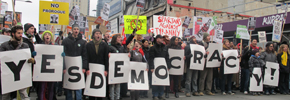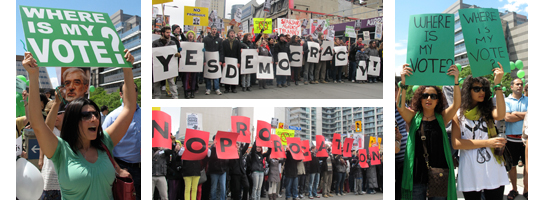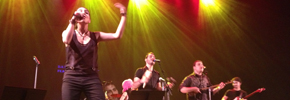ETHNIC COMMUNITY VOTES:
Sima Sahar Zerehi – Let’s be honest Canadian politics is a bit too vanilla, and not that double churned French Vanilla creamy flavour with specs of real black vanilla beans glinting in the butter-cream, but that pasty refrigerator-white low-fat frozen yogurt kind.
In comparison to the Rocky Road of politics in the Middle East and North Africa we lack a bit of zest.
Sure, low-fat frozen yogurt may be the smart choice when it comes to your waist-line but its not going to wake you up in the middle of the night for an indulgent bite of it’s sinfully mouth-watering taste.
So it’s no surprise that while a majority of Tehranto residents keep abreast of political changes in Iran and the region, many are ambivalent when it comes to politics in our adopted homeland in Canada.
As Iranians politics courses in our veins, we talk politics the way Canadians talk hockey.
Not too long ago our political debates were akin to the discussions amongst Toronto Maple Leaf fans about the Stanley Cup, we harked back to the days when victory was within reach and romanticized about a distant future when it could once again be in our grasp. We would shake our head, shrug our shoulders, and exhale a deep sigh as we wrung our hands in helplessness.
But since 2009 politics has turned from a hobby to an obsession for many of us in Tehranto.
Our political discussions now take place in urgent and hurried tones. Politics is no longer something that happened over thirty years ago in need of review and revision but what’s happening right now, and what will happen a day, a month, or a year from now.
During the Iranian election of June 2009 we witnessed how a generation of youth from our homeland were able to revive the tides of resistance by taking to the streets for their right to vote.
Idealistic youth marched into Iran’s squares and avenues with placards brandishing the slogan “WHERE IS MY VOTE?” They had gone to the ballot box in droves and wanted their votes counted.
Many Iranian-Canadians also took great measures to participate in the 2009 Iranian election. In Tehranto, a caravan of buses was organized to take people from Toronto to the Iranian embassy in Ottawa, hundreds of people lined up for hours to have their vote counted.
It may seem silly to us that anyone would care so much about the results of an election under an oppressive political system such as Iran’s. After all this is a country where every single candidate who throws their hat in the ring, must be first vetted and approved by the Guardian Council. So the idea of real political opposition is laughable. Considering the fundamentally undemocratic nature of the system it’s almost surreal that electoral fraud would incite so much outrage. But it did.
This history has already been documented; hundreds of thousands of Iranians did take to the streets initially to reclaim their right to vote, even if that was under a less than democratic system.
Today, we are witnessing the rebirth of pro-democracy movements all over the Middle East and North Africa. Youth in various countries are risking life and limb for their right to freely elect their leaders. Our leaders in Canada, in turn, are being asked to intervene in these conflicts.
So why is it that we are vigilant when it comes to democracy in the Middle East and North Africa but apathetic when it comes to who gets to be Canada’s next Prime Minister?
Frankly, I think it’s because of the embarrassing state of democracy in Canada.
Democracy is a muscle that must be exercised regularly; otherwise it atrophies, withering into just another fatty tissue weighing you down. In Canada our democratic system has grown limp with lack of exercise.
The dangerous combination of undemocratic manoeuvring and apathy has made it impossible for Canadians to flex our democratic muscles.
Oppressive governments who commit election fraud and subvert the electoral system are supposed to be stationed in the Middle East and North Africa not on Ottawa’s Parliament Hill.
Under the Harper minority government we have seen every political game played in order to subvert our democratic parliamentary system.
Since coming to power the Harper government has prorogued Parliament twice. Once in December 2008, when the Prime Minister advised the Governor General Michaëlle Jean to prorogue the House of Commons after two opposition parties had formed a coalition supported by a third party and threatened to vote non-confidence. Once again in December 2009 in order to avoid ongoing investigations into the Afghan detainees affair.
Essentially this is a minority government, which had the audacity to shut down Canada’s primary legislative institution run by elected representatives brought to power by the votes of citizens, whenever it was prevented from pushing through its agenda.
If this had happened in Iran or Egypt, we would expect the people to pour into the streets and demand regime change. In Canada, we sat at home while the media ran polite editorials featuring quotes by constitutional historians who weighed the legality of the matter.
I think the Harper government can brand itself as the Teflon government, regardless of the accusations and evidence produced to support the allegations; nothing sticks to the boys in blue.
The Harper government has sidelined accusations of documented incidents of electoral fraud from the 2006 elections; avoided the Afghan detainees scandal and serious charges regarding Canada’s involvement in human rights abuses and torture; dodged the cabinet minister Bev Oda scandal regarding funding for Kairos; and they refused to address the oppositions request for details of proposed bills and their cost estimates.
Until a week ago it seemed that nothing could stop the Harper minority government from acting like a majority government.
Although slow, the machinery of our democratic institutions did swing into action, and the Harper government became the first Cabinet in all the 54 Commonwealth nations to be found in Contempt.
The House of Commons Standing Committee on Government Operations and Estimates in 2003 defined offences as contempt if they “directly threaten the effectiveness of Parliament itself, by undermining its performance of central roles in considering legislation and holding governments accountable for their actions.”
As such an act of Contempt represents “an assault upon the democratic process itself, and when they occur in Canada they directly threaten the interests of every Canadian citizen or resident of this country.”
Still, we, the people of Canada did not take to the streets, we weren’t outraged, we didn’t erect effigies of Harper and burn them to the ground, we didn’t storm Parliament Hill and conduct mass-sit ins at the doorsteps of the House of Commons, we simply shook our heads and changed the channel to watch democracy unfold in Egypt and Libya.
When we talk about democracy in the Middle East and North Africa we always talk about how hard it is for a country like Libya or Iran to transition into a real democracy. We talk about how a culture of democracy has not been present in the region and how it may take years before real democratic systems are entrenched.
But the reality is that we live in a globalized word, where populations are constantly in flux, and information circulates with a simple click of your mobile device. Yes there are lessons that Egypt, Iran, Tunisia, Libya, Syria, Yemen and others can learn from places like Canada in terms of democracy but there are also lessons that we can learn from our counterparts in the region.
What’s the use of having a right to vote and democratic institutions if we fail to use them? How can we expect to preach democracy and human rights to oppressive governments in the region when our own governments fail to respect our parliamentary system and our human rights obligations?
Even if you are one of those who toast the New Year with “Next year in Iran!” you must see how your participation in Canadian federal politics can have an impact on the future of the Middle East and North Africa.
Although Canada doesn’t perform as large a role in global politics as our pushy neighbours to the South, we are nevertheless one of the players. While Canada declined to send troops to Iraq, we did send many troops to Afghanistan relieving the pressure on US forces in that country and making it possible for them to maintain their presence in Iraq as well as Afghanistan.
These days the focus is on Libya and just a week ago Prime Minister Harper described the military action against Libya as “war” during a meeting of world leaders in Paris. This is a far cry from the humanitarian intervention that many Canadians were hoping for.
What would the Harper government do to Iran if we were in Libya’s position? Would we want Iran at war with Canada?
Simply put, despite our ties to our homeland in Iran, Canada is our home now. If we are asking Iran, Egypt, Libya, Yemen, Syria and others to look to Canada as an example of democracy than we have to ensure that we live up to the expectations.
I hope to see my fellow Tehrantonians flock to all-candidates meetings, town-halls, and debates, I want to see us turning our workplaces, neighbourhoods, and classrooms into politicised spaces.
Let’s ask the hard questions, let’s challenge the candidates, let’s teach them what a dynamic political system looks like, let’s show our Canadian friends that the right to vote is a right to be taken seriously, and that there is an Ethnic Vote and that it will take more than a few handshakes and spoonfuls of curry to get us on side.
Finally, let’s show our friends and families in Iran what democracy can look like when people take it out for a walk. We have a vote, now let’s use it.







Canadians who complain about voting and are just too magically intoxicated by the novelty of being so outrageously more-than-fortunate !
This seems to be ironic. Here you seem to take pride that you can vote in 2 different places for 2 different governments. Because of that I wonder where your allegiance really lies. OR is it that since your transplanted, what you receive in the west is viewed as welfare to keep you alive until you return to your native country where your real heart seems to lie.
And then once in your native land, is it that then you can forget the west and what you got their? I doubt if you’d then follow those politics that you speak of in that “Tehranto”. If fact I doubt if you actually have ever stepped foot in Iran as your age seems to be that your parents fled and you were young or born in the west, but you want to think you owe something to the old world.
Remember all people of the west came from the old world, a lot had to go back and fight physically against it. While today people in those Arab/Persian countries CRY that they need the west to do something.
WHY? Why should the west do anything? Those countries asked for what they have, they supported it all along. In fact today they are still in the same place they were before oil became a big topic. There is only one country in the middle East populated by a group of people that every Arab is sworn to annihilate. And not only Arab but Persian also. I say it that way, because a government is viewed as also it’s people.
So to summarize, I distrust you as I don’t actually see where your allegiance lies. I think it’s in the East and as long as your in the west, you will take anything you can. I would think Canada might have just been too good to immigrants. Notice that suddenly the tide in the west is turning to conservatism. When the welfare spigot gets turned off, then the howls will really start.